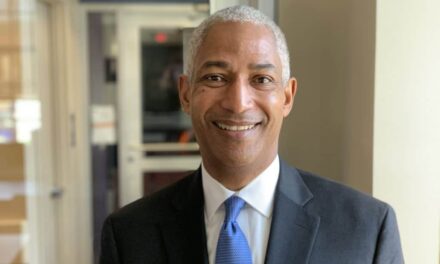
Conservatives have a deeply detailed plan for what they want former President Donald Trump to do if he wins the election in November.
The 922-page “Mandate for Leadership,” more commonly known as “Project 2025,” lays out more than 700 policy proposals and action steps.
The project was published in 2023 by The Heritage Foundation, a conservative think tank founded in 1973 during former President Richard Nixon’s administration.
Its proposed policies over the years have been the go-to manual for Republican leadership in the White House.
The foundation claims that former President Ronald Reagan made more than 60% of their recommendations official policy and that Trump “relied heavily” on their recommendations and implemented nearly two-thirds of them in his first year in office.
The Tribune read all 922 pages of Project 2025 and spoke with local leaders to identify the proposals that could have the biggest impact on Black Americans.
“They’re trying to take us back,” says Philadelphia Black Clergy President Bishop J. Louis Felton. “It’s like shifting into reverse and putting the pedal to the metal and taking us as far back as you can to a place where we never should have been in American history.”
Here are 10 proposals that could have a disproportionate impact on Black Americans.
1. Project 2025 calls for total elimination of DEI
One of the first things Project 2025 calls for is rewriting “every federal rule, agency regulation, contract, grant, regulation and piece of legislation that exists” to remove references to race, gender, abortion, reproductive health, and diversity, equity and inclusion, or DEI (page 4).
Throughout the book, the authors call for eliminating any DEI initiatives, committees, offices and staff from the federal government.
In the U.S. Treasury chapter, the authors go as far as suggesting that department leaders identify and interview every Treasury employee who participated in DEI initiatives and fire any who did not object to participating (page 708).
The authors claim that DEI initiatives are discriminatory. They don’t say who the DEI initiatives are discriminatory against, but it’s heavily implied that the authors believe they’re discriminatory against white men.
In the Department of Labor chapter, the authors say the president should work with Congress to amend Title VII to prohibit the Equal Employment Opportunity Commission, or EEOC, from collecting data on racial classifications in public and private workplaces (page 583).
They also say the president should direct the Department of Justice and the EEOC to enforce Title VII “to prohibit racial classifications and quotas, including human-resources classifications and DEI trainings” in public and private workplaces (page 582).
“We know that if you end diversity, equity and inclusion, you’re ending civil rights,” Felton says.
And the point of having civil rights laws “is to give people a basis to challenge patterns of inequality,” says Marcia Chatelain, a professor of Africana studies at the University of Pennsylvania. “The absence of that doesn’t give people an opportunity to seek remedies.”
Montgomery County Commissioners Chairperson Jamila Winder notes America wouldn’t have to have DEI initiatives if it weren’t for its dark history.
“I think conservative Republicans want to forget what led us to this moment where Black people have been and continue to be disenfranchised,” she says. “There are systems that still exist that affect Black people at work, Black people’s ability to get a home, to have access to free and quality education.
“I’d love to see a day when we don’t need DEI initiatives, but we’re not there yet.”
2. Project 2025 calls for a nationwide abortion ban
The authors say the secretary of the Department of Health and Human Services should “pursue a robust agenda” to end abortion nationally (page 450).
They call for the Food and Drug Administration, or FDA, to reverse its approval of abortion medications (page 458). Most people who have abortions do so with medication.
While the FDA goes through the process of reversing its approval, the authors say, the agency should limit the use of abortion pills to 49 days gestation.
The move would effectively ban medication abortions, as studies have shown that many women don’t learn they are pregnant until 35 to 49 days gestation.
The authors want the president to work with Congress to amend the Affordable Care Act so insurance providers no longer would have to cover the week-after pill or any other contraceptives on religious or moral grounds (page 483).
Project 2025 also calls for a prohibition of the mailing of abortion medications (pages 459 and 562).
The authors say doctors, nurses and doulas should not be required to have training in abortion procedures, and the Department of Health and Human Services should withhold funding from states with schools that require training in abortion procedures (pages 485 and 486).
Project 2025 also calls for defunding Planned Parenthood (page 471).
“Our health care delivery is not equitable in America,” says state Sen. Anthony Hardy Williams. “And those who make the least are protected the least. In this context, that disproportionately affects Black women the most.”
About 42% of Americans who had legal abortions in 2021 were Black, according to the most recent data available from the CDC. About 14% of the U.S. population is Black.
And Black people are “less likely to have access to means to get private health care,” says state Sen. Sharif Street.
Nonprofit organizations like Planned Parenthood offer more than abortion services and are the “principal provider” of reproductive health care services in many communities, according to state Sen. Vince Hughes.
“Those organizations provide services to deal with infant mortality,” he says. “Those organizations provide services to deal with high maternal mortality rates among Black women.
“That entity that provides abortion services, when you talk about eliminating those entities, you’re also talking about eliminating a whole panoply of other reproductive services, which women desperately need,” Hughes adds.
3. Project 2025 calls for the abolition of the Department of Education
The first line of the chapter about the Department of Education says “federal education policy should be limited and, ultimately, the Department of Education should be eliminated” (page 319).
The authors say all funding and policymaking in education should be done at the state and local levels without federal involvement (page 320).
And if the federal education department is not going to be eliminated, the authors say, it should be reduced to a “statistics-gathering agency that disseminates information to the states” (page 325).
“Education has for a long time been the gateway for really anybody who is sort of left out of the system to gain functional equality,” Street says.
“If you eliminate public education and the funding that goes with it, that dramatically hurts the upward mobility of poor Black people.”
Since school funding in Pennsylvania relies heavily on local real estate taxes, school districts in poorer areas already receive less funding.
“You’ve got communities in Montgomery County like Norristown and Pottstown where those school districts have been historically underfunded,” says Winder, the Montgomery County Commissioner chair. “It takes a centralized department to be at the forefront of working locally to make sure our Black and Brown children have access to quality education.”
Project 2025 also calls for an end to student loan forgiveness (page 322) and privatization of all federal lending programs (page 353).
Black college graduates hold a disproportionate amount of that debt, owing an average of $25,000 more than their white peers, EDI data shows.
The debt has contributed to high levels of stress and delayed Black college graduates’ decisions to buy homes and make other significant investments, which prevents them from building generational wealth.
It has been estimated that student loan forgiveness would increase the wealth of Black Americans by 40%.
4. Project 2025 calls for the weaponization of the Justice Department
Project 2025 says the president should “ensure that the DOJ spearheads an initiative demonstrating the federal government’s commitment to nondiscrimination,” presumably against white people (page 562).
It says the department’s Civil Rights Division should use “the full force of prosecutorial resources to investigate and prosecute all state and local governments, institutions of higher education, corporations, and any other private employers” who engage in any kind of DEI initiatives or other practices the administration deems discriminatory (page 562).
The authors claim former Pennsylvania Secretary of State Kathy Boockvar violated federal law with guidance she gave during the 2020 election, and that she “should have been (and should still be) investigated and prosecuted” (page 564).
These kinds of statements make many people question who else a conservative president might instruct the Justice Department to prosecute if he’s unhappy.
“Justice is supposed to be done equally and impartially. To add partisan bias into that function of the government is harmful,” says Timothy Welbeck, director of Temple University’s Center for Anti-Racism.
Trump also talks about giving these law enforcement officials “immunity from prosecution.”
That “should be a terrifying prospect for anybody considering that we live in the deadliest policing culture in the entire world,” Welbeck says.
So far this year, police have shot and killed 823 people — an average of about three per day. Post data shows that police kill Black people at twice the rate of white people.
5. Project 2025 calls for the elimination of Head Start
Project 2025 says the president should eliminate Head Start, the federal program that provides preschool care and education to low-income families, and the office that oversees it (page 482).
In Pennsylvania, 28,406 children were enrolled in Head Start in 2021 and 14.7% of them were Black. Head Start is crucial for childhood learning and development, leaders say.
“If you want to prepare the next generation of kids to be adults that are valuable, contributing citizens to our community, it starts at an early age,” Winder says.
6. Project 2025 calls for the reclassification of many federal employees to make them at-will employees
The introduction to Project 2025 says “the new Administration must fill its ranks with political appointees” (page 20).
And to help achieve that goal, the authors suggest that a new conservative president reinstate Schedule F, a Trump executive order that allowed federal leaders to identify “confidential, policy-determining, policymaking, or policy-advocating positions and prepare procedures to create exceptions from civil service rules when careerists hold such positions” (page 80).
Project 2025 also calls for the government to renegotiate union contracts (page 81) and “consider whether public-sector unions are appropriate in the first place” (page 82).
These kinds of changes to federal employees’ job status “could affect the operations of government” because a president could interpret Schedule F to mean that any federal employee is a policymaker or advocate, said Welbeck, from Temple.
“In many respects, the role of the government employees is to be somebody who fairly and correctly interprets whatever the intention of the law is at that moment,” Hughes says. “You want a passport? Well, you have to go through an honest assessment. You want your mail delivered? You don’t want mail delivered to only Republican people. You want it delivered to everybody. You want a fair assessment of the quality of the water you’re drinking or the air that you’re breathing. You want the analysis done by someone who doesn’t have a partisan bent, but they’re siding on the side of science and research. You could go on and on and on.”
The senator says federal employees are “hard-working citizens who do a great job. They go under the radar, but they’re absolutely necessary for the society that we need and want to have, and they shouldn’t be politicized.”
Reclassification of federal employees and installation of political appointees could also affect a major pathway for Black people to join the middle class.
“Many of our community members have been able to send their kids to college or trade and technical schools because they got federal jobs,” says state Rep. Jordan Harris.
Harris says he had an uncle who “grew up in the projects,” got a job with the post office, and was “able to take care of his entire family working at the post office.”
The representative says he also has a cousin who has graduate degrees and works as a principal at a school in the Philadelphia area.
“Both of her parents had a job with the Social Security Administration,” Harris says. “It was those jobs that put them in the middle class. It was those jobs that helped them take care of my cousin and made sure she got to college… Think about that being eliminated for our community.”
7. Project 2025 calls for a “reset” of the Department of Housing and Urban Development
Project 2025 says the federal government should “reset” the Department of Housing and Urban Development, also known as HUD, and redelegate authority to “a cadre of political appointees” (page 503).
It suggests moving some programs to other departments, consolidating some, and eliminating others, though it does not go into many specifics.
The authors call for a conservative administration to repeal the Affirmatively Furthering Fair Housing regulations instituted by the Biden administration (page 509).
The regulations direct HUD “to ensure that the agency and its program participants proactively take meaningful actions to overcome patterns of segregation, promote fair housing choice, eliminate disparities in opportunities, and foster inclusive communities free from discrimination.”
The authors also call for the elimination of the new Housing Supply Fund (page 509). The fund has $35 billion for state and local agencies to “remove barriers to affordable housing development,” according to HUD.
The proposal to reset HUD is “completely destroying public housing. It’s privatizing it, for the most part,” says Delaware County Council President Monica Taylor.
“It’s going to have a negative impact on our communities of color because we’re not going to have as much access to affordable housing. The Biden-Harris administration is expanding HUD and the resources and trying to find ways to work with local municipalities to expand affordable housing, create more workforce housing. Project 2025 does the exact opposite. It wants to downsize.”
8. Project 2025 calls for the privatization of Fannie Mae and Freddie Mac
Project 2025 calls for ending the U.S. Treasury’s conservatorship of Fannie Mae and Freddie Mac, and privatizing the two entities that aim to stabilize mortgages and maintain housing affordability (page 706).
Hughes noted that there has been a long history of racial discrimination in relation to home buying.
“So by eliminating those entities, then you’re eliminating one of the processes that has been in place to help promote and facilitate home ownership in Black communities,” he says.
9. Project 2025 calls for an end to efforts to accurately count Black Americans in the Census
Project 2025 calls for the immediate elimination of the Census Bureau National Advisory Committee on Racial, Ethnic and Other Populations (page 682).
The Census Bureau created the committee under the Obama administration to develop strategies to improve census operations and find “cost-efficient ways to increase census participation” and reduce undercounting of various racial groups.
The Census Bureau estimates that it undercounted the Black population by about 3.3% and Latinos by 4.99% in the 2020 Census.
“You can’t read into the elimination of the committee by just its top line,” Hughes says.
The federal government uses census data to draw the boundaries of legislative districts and determine how to allocate federal funds to state and local governments.
“If you don’t have folks counted accurately, then you cannot make accurate representations of what districts look like,” Hughes adds.
“Historically, Black folks have gone, usually intentionally, undercounted to make sure Black folks are under-represented. You’re essentially saying you’re working to make sure Black communities don’t get counted and don’t get represented at the city level, at the state level, and at the federal level. That’s going back to some very dark times in this country and that’s not something we want to be about.”
10. Project 2025 calls for an end to direct lending from the Small Business Administration
Project 2025 calls for an end to direct lending from the Small Business Administration (page 750).
SBA offers a variety of different loans — some specifically for women and people of color — to launch and grow businesses.
Most Black-owned businesses are small businesses, “largely because of generations of discrimination,” Hughes says.
A vast majority of minority Black and brown companies depend on SBA to get started, according to Williams.
“They didn’t have access to funding without the SBA,” the senator says. “The banks wouldn’t do it.”
The number of Black-owned businesses has grown significantly in recent years. It grew by 14% from 2017 to 2021, and gross revenue for Black-owned businesses increased by 43% during that time, according to a Pew Research Center analysis of American Business Survey data.
The Biden-Harris administration has tripled SBA funding to Black-owned businesses, according to an SBA news release. Black business owners received an average of $1.24 million a month in SBA loans.
Is there anything in Project 2025 that would help Black Americans?
The Black leaders The Tribune interviewed say they didn’t see anything in Project 2025 that would help Black Americans.
“The federal government is not perfect. I think you could offer critiques about how it operates,” says Welbeck, from Temple. “But Project 2025 is talking about eliminating essential functions of the government or making what should be non-partisan functions of government partisan.”
And who would that partisanship help?
“This is for Americans that don’t have to worry about food or housing security,” says Chatelain, the Penn professor. “This is for Americans who are directly benefiting from an investment economy. This is for Americans who don’t worry about their physical safety or that law enforcement could ever harm them. The beneficiaries of this program are very, very few Americans.”
Williams says Black Americans should see Project 2025 as a red flag.
“You should be activated and find your path against this thing.”




